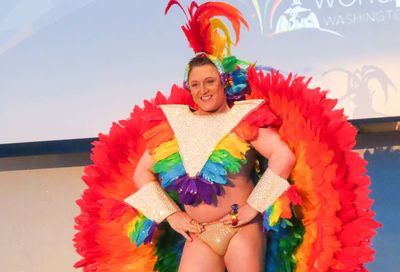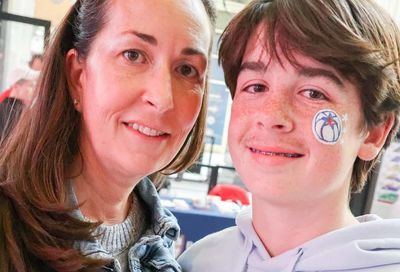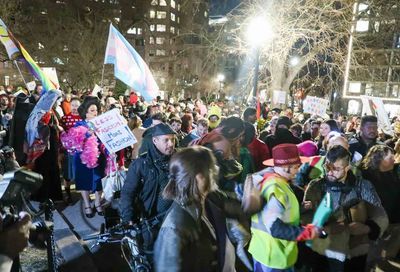Brandon Kyle Goodman wants Black Queer folx to feel ‘seen and validated’ with The Latrell Show
Goodman relays the emotional highs and lows of the past crazy year through the incisive comedy of "The Latrell Show."

Exciting and terrifying is how TV personality Latrell Jackson, the exuberant host of The Latrell Show, describes baring his soul in an episode that will feature no guests, no performances, and not even a studio audience.
Serving “gay Wakanda” in custom skintight pants with matching, muscle-baring halter, Latrell holds court from his lavender-and-fuchsia-toned set on everything from celebrity hot topics to Waiting to Exhale, Tilikum the killer whale, and his and husband Kennedy’s plans to name their new baby “Mu’Fucka,” both as a statement of revolutionary Blackness and as a branding opportunity.
The Latrell character, created and performed by actor-writer Brandon Kyle Goodman (Modern Love), is, in and of itself, a statement of revolutionary Blackness. A forthright, fabulously femme, self-proclaimed top, Latrell defies stereotype, while also offering an affirming image of a type that we never see presiding over TV talkshows.
As Goodman puts it, “Latrell is a character I’ve played for the past ten years in comedy shows and as a sort of cabaret act. It feels like all those performances have culminated into the creation of this solo show.”
Co-directed by Stefanie Black and Devere Rogers, The Latrell Show is a virtual premiere production of the risk-taking, L.A.-based IAMA Theatre company. Filmed onstage at the Pico Playhouse, Goodman’s solo performance entertains as much as it challenges, treading a familiar line of tension between keeping the convo light and sweet, and diving deep into serious issues affecting the queer community and the world at large. Latrell might like to stick with hot topics, but racism, inequality, and police brutality won’t be ignored.

The revolutionary events of the past year permeate Latrell’s consciousness, the way his alter ego Jeremiah, a decidedly less fabulous persona, permeates his being. Jeremiah’s therapy sessions periodically interrupt the talk show to deliver potent bites of truth.
Jeremiah says he’s not an angry man — he’s just disgusted and outraged by the minefield of macro- and microaggressions he must cross as a Black man in capitalist America. He expresses shame for making it to the age of 34, when Trayvon, Tamir, and Emmett never saw 21.
As funny as Latrell, but more soberly insightful, Jeremiah adds a pathos to the show that feels urgent and relatable. We can pretty much all agree with his assessment that someone calling Aretha Franklin a one-hit wonder definitely constitutes a hate crime.
“I want Black Queer folx to watch this show and feel seen and validated,” Goodman says. “I want white and non-Black folx to get an uncensored look inside the mind of a Black Queer person, and I want to make them feel our experience.”
The Latrell Show is available for streaming on-demand through Sunday, June 20. Tickets are $15 for individual viewers, and $25 for 2 or more viewers on the same device. Visit www.iamatheatre.com.
Read More:
The 40-Year-Long Fight: HIV Experts on Four Decades of the Epidemic
DC Theater Review: ‘Animal Wisdom’ at Woolly Mammoth
Gay Men’s Chorus of Washington celebrates four decades with new special ‘GMCW Turns 40’
Support Metro Weekly’s Journalism
These are challenging times for news organizations. And yet it’s crucial we stay active and provide vital resources and information to both our local readers and the world. So won’t you please take a moment and consider supporting Metro Weekly with a membership? For as little as $5 a month, you can help ensure Metro Weekly magazine and MetroWeekly.com remain free, viable resources as we provide the best, most diverse, culturally-resonant LGBTQ coverage in both the D.C. region and around the world. Memberships come with exclusive perks and discounts, your own personal digital delivery of each week’s magazine (and an archive), access to our Member's Lounge when it launches this fall, and exclusive members-only items like Metro Weekly Membership Mugs and Tote Bags! Check out all our membership levels here and please join us today!




















You must be logged in to post a comment.